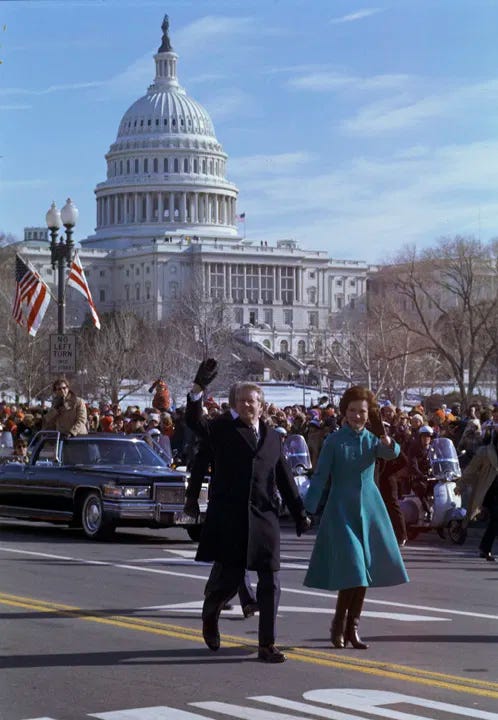
Today, President Carter’s funeral will be held at the National Cathedral in Washington, D.C. My colleague Tim Donahue offers this remembrance.
Early into his presidency, on Feb 2, 1977, Jimmy Carter addressed the nation wearing a cardigan sweater beside a crackling fire. With an energy shortage looming, he called on his fellow Americans to turn their thermostats down to 55 at night and to reflect upon their consumption: “If we all cooperate and make modest sacrifices, if we learn to live thriftily and remember the importance of helping our neighbors, then we can find ways to adjust.” He used the word “sacrifices.”
As we have just completed another warmest year on record, his prescience is only slightly less stunning than our continued ability to ignore it. Back then, nearly fifty years ago, with roughly half the global population, he said, “We must face the fact that the energy shortage is permanent. There is no way we can solve it quickly.”
Less than two weeks before this speech, I was standing on a cold, windy street corner in Washington, D.C., taking refuge by my father’s knees on Carter’s inauguration day. I could not then appreciate how he would ask his fellow citizens to summon their introspection: “We have learned that ‘more’ is not necessarily ‘better.’” But I could feel the swell of collective unity, the sun shining through the crisp, clear air on all of us brightly. “Let no one confuse our idealism with weakness,” he said. It is impossible to imagine such common comity being roused at the inauguration we’ll have in less than two weeks.
As Carter’s soul moves beyond that ranch house in Plains, GA, to the place reserved for a President-turned-Sunday-School-teacher, we are also fighting the death of his spirit. He stretched the American psyche, calling on us to think of ourselves as members of a national community. He grew the National Park system, created the Department of Education, strengthened the Social Security system, and appointed record numbers of women, and Black and Hispanic Americans to government jobs. He put solar panels on the roof of The White House; months later, a few of my neighbors had put them up as well.
Even so, the thirty-second soundbite of his presidency will feature energy and hostage crises, inflation, and recession. But he thought of Americans as capable of more than soundbite levels of thinking. He didn’t just identify a problem; he asked for us to participate in its response.
On July 5, 1979, truckers and residents of the usually quiet Levittown, Pennsylvania set bonfires to protest the inflated costs and scarcity of gas, complicated by unrest in the Middle East. Carter diagnosed that the nation was ailing from a wounded heart— more than just an energy crisis, but a crisis of spirit. Ten days after the riot, he looked at us through the TV camera: "Too many of us now tend to worship self-indulgence and consumption. Human identity is no longer defined by what one does, but by what one owns." He said that it was "fragmentation and self-interest” that prevented Americans from tackling the energy crisis. This has come to be called the Malaise Speech. But Carter did not make it to simply lay a sickness upon the American table; he was asking us to actually do something about it, to bear responsibility.
Did Americans secretly want to hear that material goods “cannot fill the emptiness of lives which have no confidence or purpose”? Were they, by that point, tired of staring blankly into the pull tabs of their Coors? Perhaps. The speech worked. Carter received an 11-point bump in his poll numbers, my neighbors boasted about their solar panels, and we heard of people trading in their cars for mopeds.
Well, it didn’t stick. In The Age of Reagan, Sean Wilentz describes a “loser” president “abdicating his role as leader and blaming the people themselves for their own afflictions." So, rather than finding sweaters to wear in the house, and heading out to the compost bin, we sat back down and turned to words that sounded an awful lot easier. “I find no national malaise,” Republican Ronald Reagan said when he announced his candidacy for president. And soon enough, he took down the White House solar panels and led people to the chairlift, where they could see that America stood like a “shining city on a hill.”
How would Carter contend with American exceptionalism today? How might he summon our reflective energies toward consumption and waste, flooding and drought, sea level rise and screen time, obesity, and pharmaceuticals? Would he prevail upon our common humanity to do what we had to do and sometimes to do it better than we thought we could? And would we be willing to slow down and think about what really matters in our lives?
President Carter made the unforgivable error of treating the American people like adults. Will any president ever do this again?



Wonderful, thoughtful piece that, too, treats its readers as adults.
Carter and Hoover should be remembered as having the most impactful post-Presidencies in modern history. RIP Mr. President. Lovely tribute Jim. Would like to see this in the WSJ or NYT.